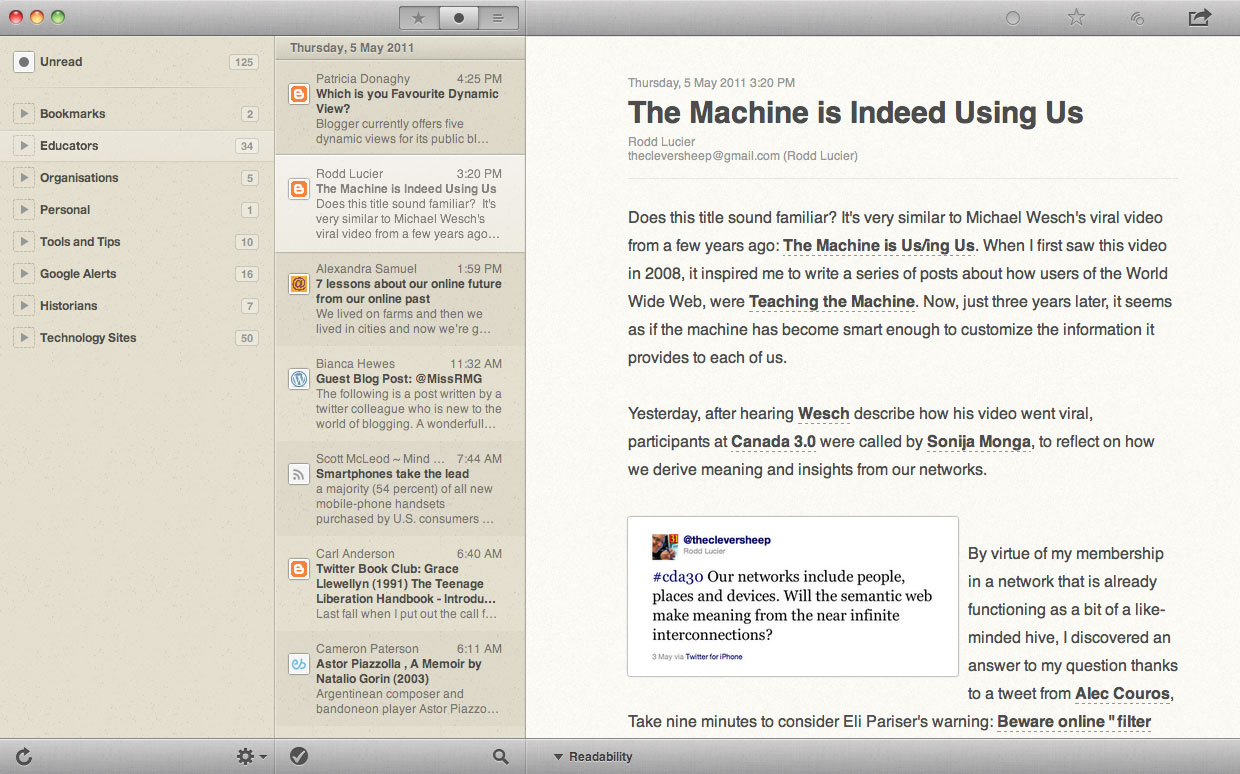

Here is the settings page for Reeder for iPad. I like the off-white tone since it is least distracting and much nicer to eyes especially when you have to go through many feeds quickly.
#MAC RSS READER REEDER MAC#
The iPad and Mac apps share similar interfaces while the iPhone has a divided/abbreviated interface. Those who like more visually appealing apps may want to check Flipboard instead. I prefer a simple interface so that I can focus on checking RSS feeds. If you check some feeds on Mac before leaving for school/work in the morning, you can start where you stop. This means that all the read articles on Mac will have the same status on iPhone and/or iPad when you open the apps next time. What is the benefit? This does not apply to those who check RSS feeds on a single platform, but those who, like me, check them on multiple platforms most likely want all their devices to start on one device where you left on another. Through Google Reader, Reeder apps snyc both RSS feeds and the status of feeds–read, unread, starred/favourite. Eventually, I realized the benefit of syncing with Google Reader. I may be wrong but I think that there is some time lag between the feeds that Reeder receives and those that Google Reader receives: the feed updates are coming through Google Reader so this isn’t a surprise if it’s indeed true. I originally didn’t like the idea of getting RSS feeds through Google Reader. Here are a few reasons why I enjoy using these apps. The reason I’m using the same apps on the different platform is most likely for consistency, but I’m not using them just for this one reason.
#MAC RSS READER REEDER FOR MAC#
I started using Reeder for Mac and have been using all the versions – Mac ($5) , iPad ($5), and iPhone ($3, iTunes links) – since I got my iPad this year. I used to use Vienna RSS as my main reader until the beta version of Reeder for Mac came out. Among many great apps, I want to talk about my favourite app, Reeder (for Mac, for iPad, for iPhone).

We have a wide range of RSS reader apps available, from Vienna RSS, to online Google Reader, to previously shareware but now freeware NetNewsWire ( also for iPad, $10, iTunes link), to social media “magazine” Flipboard (free, iTunes link). Unlike Twitter, you’ll receive more information because RSS feeds don’t have a 140 character limit, but like Facebook, the feeds contain images, videos, and even audio so the information you receive through them are more dynamic. If you want to read more, you just need to click links or titles to go to the actual pages to read the entire posts or news articles. (For your information, Atom is an alternative to RSS and it is different from RSS, but their basic functions are the same.) If you’re subscribing to podcasts, for example, you may actually receiving the latest episodes of your favourite shows via RSS.Īn advantage of using RSS feeds is to receive often summarized updates from your favourite news websites, blogs, journal websites, and so on.

Its basic function is to send out updates as rss, xml, or atom formats. RSS, often dubbed as “ Really Simple Syndication,” is a web feed format, and even if you’ve never used it, you most likely see RSS icons on news websites, blogs, and podcast pages.
#MAC RSS READER REEDER UPDATE#
To make this routine of checking blog and website update status more efficient, I use RSS feeds through Reeder. Many of us likely have a handful of blogs and websites that we regularly follow, and if we check their update status one by one, it would take a lot of effort and time. I use Facebook Pages and Twitter to find some latest information, but these two sources may not be necessarily suitable to check if my favourites blogs like academiPad have published new posts or to see if news websites updated their content. While these two sources are useful if we use them strategically, they can overwhelm us very easily because of their constant flow of massive amount of information. Where do you go to find the latest information of your interests? Twitter may be the best place to find the constantly updated site of news and rumours, and Facebook Pages and groups start playing a similar role to seed out information to us.


 0 kommentar(er)
0 kommentar(er)
